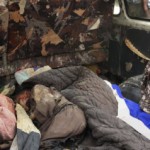 WASHINGTON — The U.S. soldier who allegedly attacked and killed 16 Afghan civilians Sunday may have experienced a relatively rare state of mental derangement characterized by a blind killing rage, a disregard of pain and danger, and a total disconnection from his fellow troops, military mental health specialists said.
WASHINGTON — The U.S. soldier who allegedly attacked and killed 16 Afghan civilians Sunday may have experienced a relatively rare state of mental derangement characterized by a blind killing rage, a disregard of pain and danger, and a total disconnection from his fellow troops, military mental health specialists said.
Officials in Afghanistan and at the Pentagon released scant details about the alleged shooter’s background. He had served three tours in Iraq, they said, and arrived in southern Afghanistan in January to help support a small special forces team in Kandahar.
It’s not clear what might have ignited his rage, said Dr. Jonathan Shay, a clinical psychiatrist who for decades has treated combat veterans with mental trauma. But he said what is known of the incident fits a pattern in which someone literally goes berserk.
Shay currently advises the Army and Marine Corps on leadership, trauma and mental health issues, and is the author of several books including « Achilles in Vietnam: Combat Trauma and the Undoing of Character. »
Berserkers, he told The Huffington Post, « have this curious quality of icy and flaming rage; all they want to do is destroy, they want nothing to get in the way of their unmediated destruction and killing, and they are truly insensitive to pain. They are totally beyond the society of their own military forces and disconnected from them. »
« It’s a painful and destructive thing and usually fatal for the soldier. And it’s fairly rare — in 20 years I had only two patients who unmistakably had episodes of berserkness, » Shay said. The term « berserk » is an Old Norse word describing the frenzied trance in which some warriors fought.
The link between combat stress and outbursts of violence was well documented even before troops began routinely serving three, four or more combat deployments in Iraq and Afghanistan over the past decade. But PTSD and violence among veterans has become more prevalent. A study conducted at the Puget Sound Veterans Affairs hospital in Washington, for instance, demonstrated high levels of anger and hostility among returning combat veterans screening positive for post-traumatic stress disorder (PTSD).
According to a recent U.S. Army study, about 472,000 troops who served in Iraq or Afghanistan may have some form of PTSD.
But a rampage against unarmed civilians goes well beyond the domestic violence and abuse reported by some families of veterans with PTSD.
Officials at the U.S.-led military command in Afghanistan said Monday they had detained a lone suspect in the shooting, a U.S. Army staff sergeant, a conventional soldier rather than one of the highly trained, elite special forces or Green Berets with whom he was assigned.
The father of two, he had been based at Joint Base Lewis-McChord, outside Tacoma, Wash. Headquarters of numerous Army and Air Force combat units, Lewis-McChord has been plagued by high rates of suicide and PTSD and is the home base of the notorious « kill team » of soldiers accused of killing three Afghan civilians for sport two years ago. The GI newspaper Stars & Stripes once called Lewis-McChord « the most troubled base in the military. »
Officials said the alleged shooter gave himself up after the killings Sunday.
Military psychiatrists and counselors at VA hospitals who work with mental health issues agreed to discuss the case only if not identified because the VA and the Pentagon have put a lock on all information relating to the case.
Shay — who is retired — and others who discussed possible causes of the incident emphasized that almost nothing is known about the suspect or the circumstances of his military service, and that the precise causes of his actions may never be known. Many of them also stressed that while there may be deep psychopathic causes of his behavior, obviously nothing can justify the killings.
But Shay speculated that the shooter may have felt isolated from the special forces soldiers with whom he shared the small outpost. He may not have gotten enough sleep because of isolation and stress. Both factors, as well as the death of close comrades during past deployments, can contribute to violent outbursts.
« Special operations forces are very insular, and he may have been treated as a complete outsider, » said Shay. « And sleep is unmistakably the fuel for the frontal lobes of the brain, and when you’re out of gas in the frontal lobe you become a moral moron — a catastrophe with no moral restraint. » Combat stress, or PTSD in its most virulent form, tends to disrupt sleep.
There may have been other issues that prompted his behavior, Shay said, which should have been evident to his supervisors.
« Whoever this man’s leaders were really weren’t paying attention, » said Shay. « This is not something like, ‘Oh — he just snapped.’ That’s a convenient cop-out. If you know your people, this kind of thing doesn’t happen. »
AP



